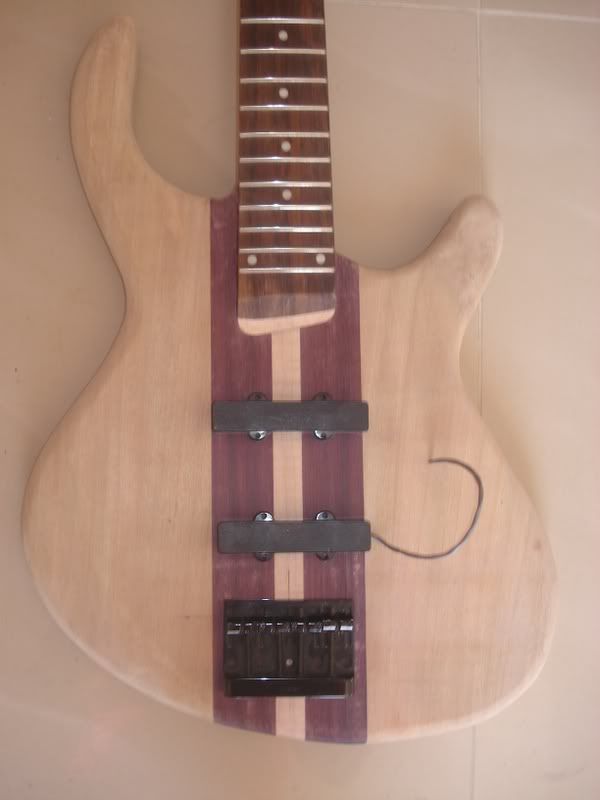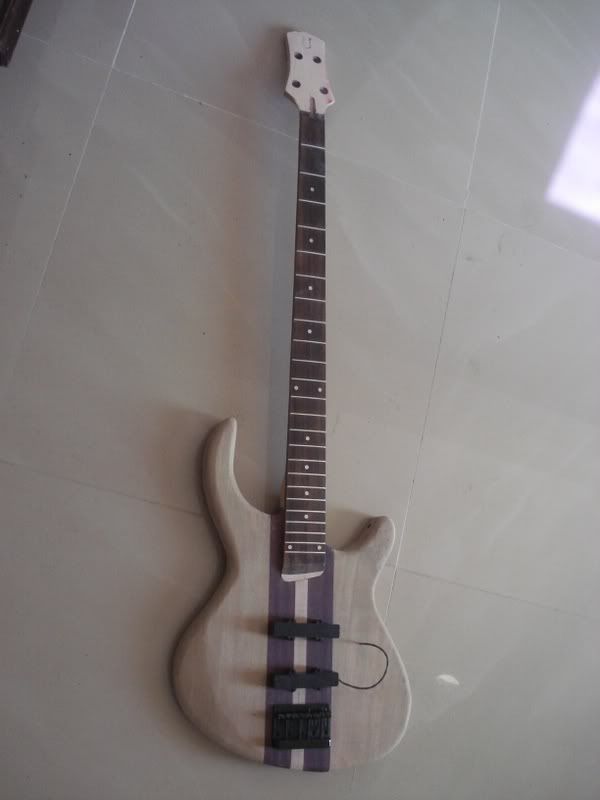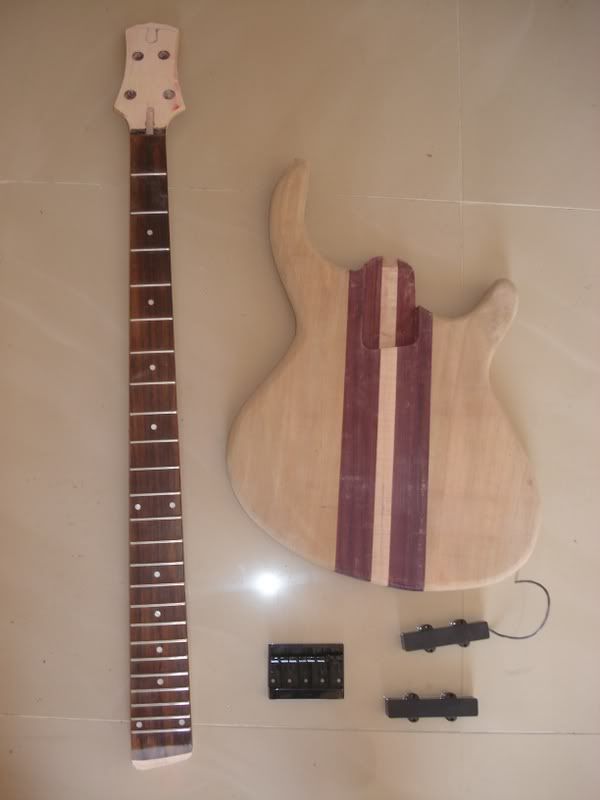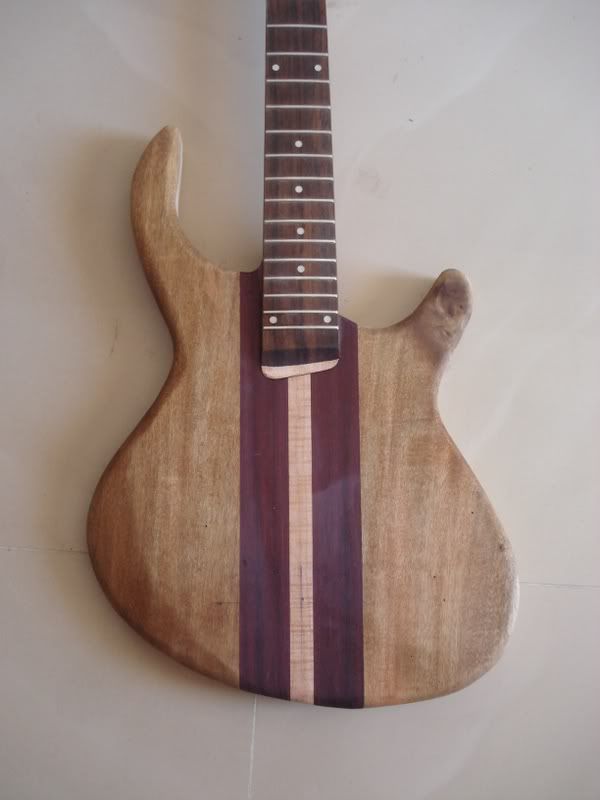-
Posts
262 -
Joined
-
Last visited
Content Type
Profiles
News and Information
Tutorials
Product Reviews
Supplier Listings
Articles
Guitar Of The Month
Links and Resources
Forums
Gallery
Downloads
Posts posted by guitar_player
-
-
I forgot to order some from stewmac and only have white and don't want to pay $15 to get a piece of plastic so if anyone has any extra here that they could send me. I would gladly paypal you 4 or 5 dollars
-
Yeah, that was my fear.
I have used a pad sander for scuff sanding cabinet parts at work before and I just saw in martin koch's guitar making book a company that used an air one for scuff sanding. I'm not sure if they used wet or dry, I used dry and went over the surface once twice if it needed it no more. You would have to be careful but to do the back and the front it's possible.
-
I have a customer that wants me to build him a strat body with gibson sized binding. So how wide is it? and how deep should I rout the slot?
-
I just got a good deal on a compressor it's a $600 Campbell Hausfeld that I got for $100
 so in the near future I'm going to set up a spray booth in my shop. I will only be spraying water based lacquer. Would a regular 16 inch fan pointed out a window be fine. I am planning on attaching some tubing to the ceiling and attaching 2 shower curtains together to make them higher and using those to make a temporary room when I'm spraying. Is this a decent idea?
so in the near future I'm going to set up a spray booth in my shop. I will only be spraying water based lacquer. Would a regular 16 inch fan pointed out a window be fine. I am planning on attaching some tubing to the ceiling and attaching 2 shower curtains together to make them higher and using those to make a temporary room when I'm spraying. Is this a decent idea? -
good point.. i found these fingerboard templates and this piece you can put any two radius templates into, run through a planer, and itll give you any compound radius on the fingerboard that you want.. looks really cool
sounds interesting do you have a link?
-
I just started a new build - a Tele style guitar, and immediately broke 2 jigsaw blades trying to cut the 45mm thick body shape. So I went down to the hardware store for blades.
However, I also looked at the new power jigsaws because mine is over 30 years old, and is making some nasty sounds
 I was surprised at what was on offer, especially a 'new' feature called "pendulum action" and "orbital". Instead of just reciprocating the blade up and down like my old one, it moves it forwards and backwards "pendulum" style. Also a big 750 watt motor version was still quite cheap. So I bought it.
I was surprised at what was on offer, especially a 'new' feature called "pendulum action" and "orbital". Instead of just reciprocating the blade up and down like my old one, it moves it forwards and backwards "pendulum" style. Also a big 750 watt motor version was still quite cheap. So I bought it.Well, WHAT a difference. It slices through the 45mm slab like butter. As an experiment, I tried the various settings for more or less "pendulum" action. On zero, it struggles, just like my old jigsaw, but the more action you give it, the faster it shoots through the hardwood.
The downside is that I have much less justification for buying a bandsaw later

Yeah some jig saws cut pretty fast and nice I barely ever use them though. The badsaws much easier ad more useful and it's cheap to get one used or even new if you don't care about resawing.
-
I use files, and sandpaper adhered to large flat surfaces for shaping my nuts. A coping saw or a dremel tool if my blank is quite oversized.
For sanding/shaping small pieces, I will say that I love the little 1" wide, long-belt sanders, like Frank Ford uses as shown at Frets.com frequently. I don't own my own (yet!) but after using one, I think I'd actually get more use out of that than a belt sander, for the work that I do.
Those are awesome they have a couple at school there great fro shaping small parts and stuff like that and grizzly sells them for $54
-
How can you spend that much I mean files are maybe $10 a piece at the most for decent ones. You can get a set of drill bits for $50
I have at least 200 files. Yes, *you* would have spent $10 for each. I didn't. hehehe
"Drill bit set for $50.00". Yes, perhaps you are unaware of a whole set of numbered bits, letter bits, fractional bits, forstner bits, brad point bits, bits reground to work better on wood/plastic, bits left stock for metal, metric bits. not to mention where they are made, I have some made in Germany and made in USA, as well as crap Chinese ones (I try to use these for the house rennovation work, but they are often too crappy for even that ! )
I said the little things add up. I can see you are not aware of all the little things.
How about taps and reamer and dremel bits ? I got my share of that damn crap too.
Dial indicators, straight edges, fret spacing ruler, nut spacing ruler, oh yeah, the damn nut files, I don't even know if those are included in the 200, but I did pay full price for 95% of those bastards !
lol I wouldn't have spent $10 mine are free

sorry I'm aware that there are alot I just figured you didn't even have a bandsaw you wouldn't have all of those tools/
-
just a quick question as I'm trying to figure out the best way to level frets:
radius block with sandpaper, long straight beam with sandpaper or a grinding stone are the possibilities that come to mind.
what do you use? and why?
thanks
I just have a straight piece of wood I put some doublestick tape on and 220 on one side and 600 on the other side takes a couple minutes to level them.
-
I would put a veneer on it the arm contour looks horrible. I had one of those yamaha pacificas for a first guitar wish I had never gotten rid of it, oh well I'll buy another one someday.
-
Hi i would like to trade a copy of a Tobias bass i was building for my band, but i need other stuff rather than a bass.
The neck was bought off Ebay, it's brand new, in perfect shape, maple neck, rosewood fretboard, 34", and 24 frets
The body was made by me, it's made of Apamate, purpleheart, curly maple, purpleheart and apamate. Apamate is a venezuelan wood that resembles Korina, but way harder, it is a bit harder than mahogany.
I also include a set of Jazz bass pickups, made by tech parts, again, never used, although one onf the has it's leads broken, so you have to solder a couple new cables to use it, and a bridge.
I would like to get 2 of these guitar speakers:
http://warehousespeakers.com/proddetail.ph...od=veteran30_12
Their price, including shipping to Venezuela it's 230$ for 2 speakers.
I send you the Tobias copy body, the neck, pickups and bridge and i pay for the shipping to the USA ( or wherever you are) via EMS which gets the package to your house in a 7-10 days.
Here are some pics:



And here's a pic of the bass body with a bit of thinner wiped on to see how it'd look once finished.

I have a couple veteran 30's but can't justify shipping but if you have trouble getting some and are willing to pay shipping I'll do it.
-
Hard to answer because I'd guess around 35% of my tools pull double duty for guitar work and house rennovation work.
Must be at least $3,000, and probably not over $5,000. I'm not including supplies (you know, like $60 $90.00 worth of stain at any given moment, $100 to $300 worth of sandpaper at any given moment).
I don't even have a bandsaw or jointer and all kinds of other stuff. It's the damn little stuff that adds up. I have around $400-$500 worth of drill bits. $200.00 in files, although they should have cost at least $1,000 (my only lucky deal of the century-- guess I used up my lotto winning luck. Bad move).
When I started out, I'd guy buy every crap thing I could think of, if I had enough money for it. Like if I wanted to make a template, I'd go buy plexi or plywood or MDF. Now I keep an eye out and find junk like that for free.
How can you spend that much I mean files are maybe $10 a piece at the most for decent ones. You can get a set of drill bits for $50 (of course you might want to multiply that by 2 or 3 for how many sets you will buy when you loose them
 ). For me I have been lucky enough to have an equipped workshop and couldn't imagine starting from scratch, I already have enough tools to make guitars but I'm going to be spending about $500 for specialized tools that are going to make it alot easier. I also need to get a spray system setup the booth and sprayer will cost me maybe $150 but my compressors crap and needs to be upgrading so I'm checking out craigslist all the time.
). For me I have been lucky enough to have an equipped workshop and couldn't imagine starting from scratch, I already have enough tools to make guitars but I'm going to be spending about $500 for specialized tools that are going to make it alot easier. I also need to get a spray system setup the booth and sprayer will cost me maybe $150 but my compressors crap and needs to be upgrading so I'm checking out craigslist all the time. -
hm i have always done my nuts with files and a radius block that matched the fingerboard radius. Belt sander kinda seems like overkill but maybe someone else can chime in. What exactly do you mean by how much power you will need?
I use a belt sander here's the one I use http://www.shop.com/Ryobi_3_x_21_Variable_...ml?sourceid=298
I put it upside down and use the slowest speed for nuts and it's good for doing strat contours and I attach it to a table to sand edges of bodies and necks. It's a great tool for $90. check out craigslist too and it would be better to get a bandsaw I have seen them on craigslist around here for under $50.
also I used the rigid for a little bit when doing a strat and it worked great never tried the belt attachment though
-
As long as they were made by the same company and are the same dimensions they should you might need to fill and redrill the holes in the neck (if there are any).
-
Well, I wasn't going to jump into this one, but since Foggy broke out the can opener I'll let a few more worms out.
There are times and places that oil finishes fit very well, even on solid body builds. I love the feel of a oiled neck over a poly'd one, but oil finishes are not the end all be all. There is no oil finish that is going to adhere over a painted guitar. Many guitarist like painted bodies, especially the graphic paint jobs. How many people would pay good money to have the paint job scratched off in less than a year because the oil finish failed and rub off in the first month. I highly doubt the oil paints used buy artists are going to stand up too well to a 25 year old bouncing around on stage for an hour, sweating all over his guitar.
I figured it out myself

-
Does anybody know which guitar is this?

I'm not sure but try harmony central you will get a fast answer and I seem to remember seeing one there lately.
-
your fine if it was a 16th I'd put a shim under it but a 32nd I wouldn't worry about
-
The cost all depends on what you want. I took an old guitar and stripped it of the hardware and built a new body for it and the total cost was basically the cost of the wood. For a solid alder body it was like $30-40. But then the next guitar I built I spent several times that. And I know of builds that make even that look cheap. The tools are something that requires thought as to how often you plan on building. If you just want to build one or two, then a whole slew of tools may not be the best option. However, if you plan on doing this a lot, then invest in good tools to do the job right. It all depends on what you want to get out of it and how many you want to make.
It costs as much as the wood and parts...no more. As long as you have tools you may find yourself buying a few more that would be helpful with building a guitar.
-
I have a build finished in tru-oil hanging in my closet curing right now. It looks absolutely beautiful on the walnut and flame maple. It is not as hard or durable as nitro, though a lot of production guitars put enough clear on to withstand a nuclear blast. It does look great, but it darkens the wood a fair amount if the wood is not sealed. It is easy to put on, though you still have to develop a routine that works for you to make sure your finishes come out perfect. There is a lot more prep work than with nitro, but there is a lot less work done on the finish itself. You can use aniline dyes to color the wood underneath, but I would stay away from tru-oil over paint. I have never done it, but unless the tru-oil sealer works well over paint, I am not so sure on what the adhesion of tru-oil to paint would be. Of course, you can try that for yourself, like I said, I've never done it (I prefer transparent finishes). Here is a picture after the last coat was applied.
Hope this helps.
That looks great my next guitar with a clear finish will be tru oil. Eventually I'll get a spray system set up.
-
Why not? If there are any stiffness issues with poplar for a neck, the maple would surely work towards counteracting it. It'd look pretty bland, but that can easily be covered with stain or paint.
I think there's something in recent post maybe it's a few posts down with someone using poplar for a neck it was the first time I heard of it.
-
I usually have someone do a lacquer finish on my guitars but it's expensive didn't come out good on my last guitar and I'm going on waiting 3 weeks for a guitar that took me 2 weeks to build and the body hasn't been touched yet.
If you've got lot's of interest in your guitars and your seriously thinking of going into it fulltime then you're quite right to look at doing your own finishing work - that way you can do the finishes you want to do AND keep the quality level where you want it.
There are a couple of issues that really should be pointed out here though as I read similar comments to those quoted above on an all to regular basis.
The reason that finishing guitars is expensive is because it is a specialist job (done properly). It is not the same as lacquering 2 pack paint on a car or motorbike, guitar finish needs to be flawless and near enough perfect - that takes time, is very labour intensive and hence is expensive. Also as has been already indicated here, there is a lot of capital outlay involved in kitting up for professional level spray painting and finishing - it's not a case of simply buying a few rattle cans and spraying up in your garage, or on a nice day outside. I should point out here that there is absolutely nothing wrong with using rattle cans, spraying in your garage or outside (I started myself this way), but when you're talking about providing a professional finish for paying customers, it quite soon becomes a different ballgame.

 Look into setting up a spray booth, buy your compressor, your guns, your paint and go for it........it's the only way you'll appreciate what's involved and maybe then your views will change slightly. Don't take this as a side-swipe at you personally, but I've read and heard comments like these so many times before. Simple fact of the matter is that the finishing on a guitar is usually the most time consuming part of the build - not to mention often the key element in how the finished guitar will look and feel.
Look into setting up a spray booth, buy your compressor, your guns, your paint and go for it........it's the only way you'll appreciate what's involved and maybe then your views will change slightly. Don't take this as a side-swipe at you personally, but I've read and heard comments like these so many times before. Simple fact of the matter is that the finishing on a guitar is usually the most time consuming part of the build - not to mention often the key element in how the finished guitar will look and feel. But all that said, the best of luck with your venture.

Jim
Thanks, I'm pretty sure I'll end up not finishing ones I make for people, at least for now I would like to get a spray setup and probably will sometime. How well does tru oil come out on a clear finish though I've seen it on some guitars and it's looked great but those were just pictures?
-
For solid colors, probably your best option would be to use tinted nitro. If you plan on doing guitars for a living, you will need a spray booth and good HVLP system. Then you could just mix the tint with your nitro and spray a couple coats. Then spray clear. If you want more info on how to spray nitro, LMI has a good tutorial on their website.
I'm planning on it but for now I'm just trying to do a few and get a reputation built up, I can't really afford a spray booth. I guess I'll add that to the list of things I'll eventually need.
-
I usually have someone do a lacquer finish on my guitars but it's expensive didn't come out good on my last guitar and I'm going on waiting 3 weeks for a guitar that took me 2 weeks to build and the body hasn't been touched yet. I am building or trying to build cut;om guitars for people nothing set in stone yet probably have 5 people I'm talking to about it now. It's what I'd like to do with my life (probably not happening). So I want to be able to finish my own guitars but have it come out good and not crappy. I'm thinking of doing clear coated guitars with tru oil but a lot of people want solid color guitars and I don't know what to do for that. Could I just get regular paint from home depot or somewhere and paint it and do some clear coat over it? I really have no clue so any help would be appreciated.
-
I just figured out how I'm can make the whole thing with my lathe and it'll be big enough for 1 piece guitar bodies if I ever need to do that. All I'll need is some sandpaper. If anyone has a lathe and wants a thickness sander message me and I can try to help you with it. I'll probably do it Friday since there's no school.



Dentist Bits For Inlay....anybody Need Any ?
in Inlays and Finishing Chat
Posted
I could use some, they would fit in a dremel right?